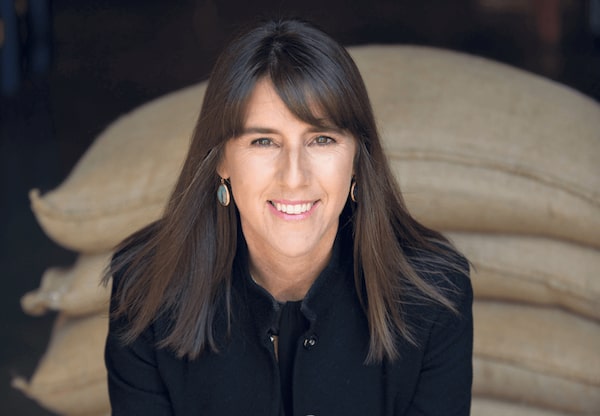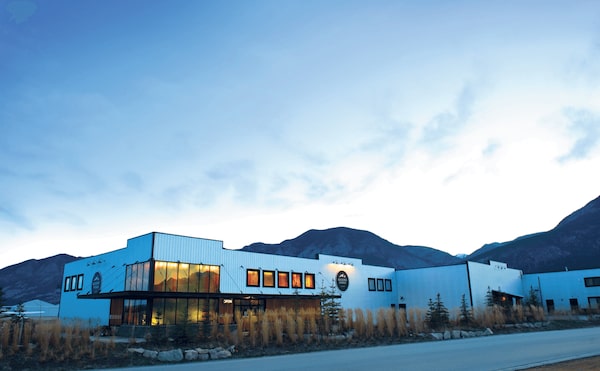
Elana Rosenfeld co-founded Kicking Horse Coffee to make a positive impact on the local community as well as the communities where the coffee is grown through organic and Fairtrade practices.SUPPLIED
Kicking Horse Coffee takes its name from a nearby river and mountain pass, yet the company also embraces the image this moniker evokes. An equine kick is usually delivered with some force to underscore an urgent concern – and this resonates with Elana Rosenfeld, co-founder and CEO of Kicking Horse Coffee, who also has an important message to pass along.
“We make coffee to help people wake up and kick ass,” she says. “We need the world to wake up, to reveal undiscovered good, to seek out and reward the unconventional, to consciously celebrate and inspire.”
At first glance, this may seem a tall order for a “Cup of Joe” – but Kicking Horse Coffee, which produces 100 per cent certified organic, Fairtrade, shade-grown Arabica beans roasted in Canada’s Rocky Mountains, is proving itself a powerful vehicle for change, impacting the people who are involved, the communities where the company operates and the environment, according to Ms. Rosenfeld.
“Beyond great coffee, it’s the spirit we do business with that is most important to us,” she says. “Why organic? Why Fairtrade? Because we want the world to wake up with us, one cup at a time.”
Certified organic means the coffee is pesticide-free, full of flavour and good for the consumer, she says. “And there is no exposure to pesticides for the farmers and families who grow our coffee. Together, we believe in smart farming and planning for tomorrow.”
Community engagement and impact
Kicking Horse Coffee has developed long-term symbiotic relationships with coffee farmers, their families and communities, and Ms. Rosenfeld says the supply chain starts with very small farms of less than three hectares on average. “Our farmers gain better security and dependable farming practices. They have more consistent yields and incomes, which means working with them has reduced economic instability in the communities where the coffee is grown.”
By ensuring proper care and attention to biodiversity and reducing chemical pesticides, herbicides and fertilizers, both people and the environment benefit. “We’ve invested in the communities where our coffee comes from for over 20 years,” she says. “The more we work together, the better the relationship becomes. We rely on our farmers and their communities, and they rely on us.”
This commitment to community, to being socially responsible and to good practices for the planet also extends to Kicking Horse Coffee’s operation in Canada, where it has built a reputation for being one of the region’s most stable employers.
“We’re headquartered in a small town in the Rocky Mountains. It’s rugged, more gravel than pavement. But the altitude is perfect for roasting coffee and just playing outside in general,” says Ms. Rosenfeld. “Every day, we’re proud to have ended up here, supporting our community with jobs and creating stability due to our growth and intention.”
In 2018, this dedication found reflection in Kicking Horse Coffee being named Canada’s Best Place To Work. “We care about our community of coffee drinkers and producers, and we also care about the well-being of our Kicking Horse Coffee community.
“Next to coffee, humans are our favourite kind of beans,” she adds with a laugh.
The impact of COVID-19
The COVID-19 pandemic, which affected virtually every area of the economy, has also posed significant challenges to farming around the world, says Ms. Rosenfeld. “In addition to an increase in awareness around health and hygiene, adjustments had to be made to find workers during the harvest season, which has been a challenge.”
Milling facilities had to implement new policies and procedures for health and safety, and even the trucking and shipping industry at ports had to make changes, she explains. “Originally, this put a significant strain on supply. But thankfully, all of our partners have been creative and able to adapt, meaning the flow of coffee is back on track.”

The altitude in the Rocky Mountains is perfect for roasting coffee, and the operation of Kicking Horse Coffee has grown steadily for more than two decadesSUPPLIED
More than two decades of business growth
Since it was founded in 1996, Kicking Horse Coffee has been dedicated to making “coffee that is good for people and the planet. That’s why we’re considered an early pioneer in the organic and Fairtrade coffee market,” says Ms. Rosenfeld. “We’re a values-driven company – and that means we’re committed to the same values and principles that have guided us since the beginning.
“We started out roasting small batches of beans in our garage. Since then, the garage has grown bigger, and there are a lot more beans, but it’s basically been the same business.”
Interest and awareness in organic and Fairtrade products have significantly increased over that time, helping to take Kicking Horse Coffee to the top: it is now North America’s number one roast and ground organic coffee, Canada’s number one whole bean coffee, plus the most trusted coffee brand in Canada.
This success story reflects the way consumers connect their ethics to the products they purchase, says Ms. Rosenfeld. “Regardless of personal motivation, more and more people are choosing to support businesses that demonstrate environmental and social responsibility. Authentic, ethical alignment resonates with consumers.”
What does this trend mean for the future? For Ms. Rosenfeld, “there’s a whole generation of dreamers and doers who’ve become disenfranchised with big company BS. If a company doesn’t offer trust or show alignment with ethical values and principles, they’re probably going to get left behind.”
That’s why Kicking Horse Coffee sees accountability as key to success. “Coffee growers are accountable to us, so we can be accountable to our coffee drinkers,” she says. “There’s a future to create, and that’s why we’re here.”
Produced by Randall Anthony Communications. The Globe’s editorial department was not involved in its creation.